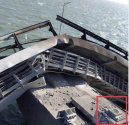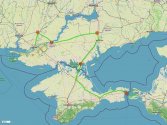The only thing the West—now that they are on the offensive—can negotiate is his capitulation and the division of Russia into mini states .I have long had the feeling that Putin is obviously waiting for something, everything seems to me like a strategic expectation, otherwise I can't explain all this passivity during a "special military operation".
And now I come across this article published today on CNN:
Putin wants to negotiate a new "grand bargain" between Russia and the West, Turkish official says
From CNN’s Niamh Kennedy and Jaya Sharma
It looks inevitable that Russia's war in Ukraine will continue for some time -- and the question is how much damage will have occurred before negotiations resume, according to a spokesperson for Turkish President Recep Tayyip Erdogan.
Earlier on Friday, Erdogan spoke with Putin about the "latest developments" in the war in Ukraine, according to a readout from the Turkish government.
His spokesperson, Ibrahim Kalin, told CNN that negotiations will likely resume at some point.
Negotiation ground to a halt after Russia’s annexation of four Ukrainian regions last week, with Ukrainian President Volodymyr Zelensky going so far as signing a decree declaring negotiations impossible.
The decree, published on the Ukrainian Presidency’s website, declared "the impossibility of holding negotiations with the President of the Russian Federation Vladimir Putin." It was dated Sept. 30, the day on which Putin announced that he would illegally annex four partially-occupied regions of Ukraine.
Kalin said the halt in talks was to be expected, adding he had recently discussed the issue with US National Security Advisor Jake Sullivan.
The Turkish official said there was also a larger point at play when it comes to Russian involvement in negotiations.
Moscow feels that the agreements made at the end of the Cold War, under Presidents Mikhail Gorbachev and Boris Yeltsin, no longer reflect the Russia of today, he said. "There is a new Russia, there is a new world, there is a new reality, and they want to have a new bargain,” Kalin said.
As a result, the entire global liberal order is facing a big test, he said.
Either he is playing 7D chess or is the worst war time leader in the recent past.


